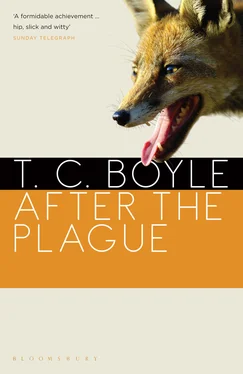It was raining the next morning, a cold rain that congealed on the hood of the car and made a cold pudding of the sidewalk out front of the house. I wondered if the weather would discourage the Jesus-thumpers, but they were there, all right, in yellow rain slickers and green gum boots, sunk into their suffering with gratitude. Nobody rushed the car when we turned into the lot. They just stood there, eight of them, five men and three women, and looked hate at us. As we got out of the car, the frozen rain pelting us, I locked eyes across the lot with the bearded jerk who’d gone after the girl in the white parka. I waited till I was good and certain I had his attention, waited till he was about to shout out some hoarse Jesus-thumping accusation, and then I gave him the finger.
We were the first ones at the clinic, what with the icy roads, and as soon as my brother disappeared into the sanctum of his office I went straight to the receptionist’s desk and flipped back the page of the appointment book. The last entry, under four-thirty the previous day, was staring me in the face, neat block letters in blue metalpoint: “Sally Strunt,” it read, and there was a phone number jotted beneath the name. It took me exactly ten seconds, and then I was in the back room, innocently slipping into my lab coat. Sally Strunt, I whispered to myself, Sally Strunt, over and over. I’d never known anyone named Sally — it was an old-fashioned name, a hokey name, Dick and Jane and Sally, and because it was old-fashioned and because it was hokey it seemed perfect for a teenager in trouble in the grim sleety washed-out navel of the Midwest. This was no downtown Amber, no Crystal or Shanna — this was Detroit Sally, and that really appealed to me. I’d seen the face attached to the name, and the mother of that face. Sally, Sally, Sally. Her name sang through my head as I schmoozed with Fred and the nurses and went through the motions of the job that already felt as circumscribed and deadening as a prison sentence.
That night, after dinner, I excused myself and strolled six cold wintry blocks to the convenience store. I bought M&M’s for the boys, some white chocolate for Denise, and a liter of Black Cat malt liquor for myself. Then I dialled Sally’s number from the phone booth out front of the store.
A man answered, impatient, harassed. “Yeah?”
“Sally there?” I said.
“Who’s this?”
I took a stab at it: “Chris Ryan. From school?”
Static. Televised dialogue. The roar of Sally’s name and the sound of approaching feet and Sally’s approaching voice: “Who is it?” And then, into the receiver: “Hello?”
“Sally?” I said.
“Yes?” There was hope in that voice, eagerness. She wanted to hear from me — or from whoever. This wasn’t the voice of a girl concealing things. It was open, frank, friendly. I felt expansive suddenly, connected, felt as if everything was going to be all right, not only for me but for Sally too.
“You don’t know me,” I said quickly, “but I really admire you. I mean, your courage. I admire what you’re doing.”
“Who is this?”
“Chris,” I said. “Chris Ryan. I saw you yesterday, at the clinic, and I really admire you, but I just wanted to know if, uh, if you need anything.”
Her voice narrowed, thin as wire. “What are you talking about?”
“Sally,” I said, and I didn’t know what I was doing or what I was feeling, but I couldn’t help myself, “Sally, can I ask you something? Are you pregnant, or are you—?”
Click. She hung up on me. Just like that.
I was frozen through by the time I got back with the kids’ M&M’s and Denise’s white chocolate, and I’d finished off the beer on the way and flung the empty bottle up under a squat artificial-looking spruce on the neighbor’s lawn. I’d tried Sally twice more, after an interval of fifteen or twenty minutes, but her father answered the first time and when I dialled again the phone just rang and kept on ringing.
A week went by. I scrubbed out test tubes and jars that smelled powerfully of the urine of strange women and learned that Fred didn’t much care for Afro-Americans, Mexicans, Haitians, Cubans, Poles, or Hmong tribesmen. I tried Sally’s number three more times and each time I was rebuffed — threatened, actually — and I began to realize I was maybe just a bit out of line. Sally didn’t need me — she had her father and mother and maybe a gangling big-footed slam-dunking brother into the bargain — and every time I glanced through the blinds in the back room I saw another girl just like her. Still, I was feeling itchy and out of sorts despite all Denise and Philip and my nephews were doing for me, and I needed some sort of focus, a plan, something to make me feel good about myself. They’d warned us about this in rehab, and I knew this was the trickiest stage, the time when the backsliders start looking up their old friends and hanging out on the street corner. But I didn’t have any old friends, not in Detroit, anyway, and the street corner was about as inviting as the polar ice cap. On Saturday night I went out to a bar that looked as if it had been preserved under Plexiglas in a museum somewhere, and I came on to a couple of girls and drank too much and woke up the next morning with a headache.
Then it was Monday and I was sitting at the breakfast table with my brother and my two nephews and it was raining again. Sleeting, actually. I wanted to go back to bed. I toyed with the idea of telling Philip I was sick, but he’d probably insist on inserting the rectal thermometer himself. He sat across from me, expressionless, crunching away at his bran flakes and sunflower seeds, the newspaper spread out before him. Denise bustled around the kitchen, brewing coffee and shoving things into the microwave while the boys and I smeared Eggo waffles with butter and syrup. “So,” I said, addressing my nephews over the pitcher of pure Grade A maple syrup, “you know why the California kids have it all over the Midwestern kids when it comes to baseball?”
Josh looked up from his waffles; Jeff was still on dreamtime.
“Because of this,” I said, gesturing toward the dark windows and the drooling panes. “In L.A. now it’s probably seventy degrees, and when the kids wake up they can go straight out and play ball.”
“After school,” Josh corrected.
“Yeah,” I said. “Whatever. But that’s the reason your California and Arizona players dominate the big leagues.”
“The Tigers suck,” Josh said, and his brother glanced up to add his two cents. “They really suck,” he said.
It was then that I became aware of the background noise, a thin droning mewl from beyond the windows as if someone were drowning kittens in the street. Philip heard it then too, and the boys and Denise, and in the next moment we were all at the window. “Oh, shit,” Philip hissed. “Not again. Not today, of all days.”
“What?” I said. “What is it?” And then I saw, while my nephews melted away and Denise gritted her teeth and my brother swore: the zombies were out there at the edge of the lawn, a hundred of them at least. They were singing, locked arm in arm and swaying to the beat, stretched across the mouth of the driveway in a human chain.
Philip’s face was drawn tight. He told Denise to call the police, and then he turned to me. “Now you’re going to see something, little brother,” he said. “Now you’re going to see why I keep asking myself if I shouldn’t just close down the clinic and let the lunatics take over the asylum.”
The kitchen was gray, a weak, played-out light pasted on every surface. Sleet rattled the windows and the conjoined voices mewled away in praise of mercy and forgiveness. I was about to ask him why he didn’t do just that — close up and move someplace friendlier, someplace like California, for instance — but I already knew the answer. They could harass all the chalk-faced Sallys and thump all the Bibles they wanted, but my brother wasn’t going to bow down to them — and neither was I. I knew whose team I was on, and I knew what I had to do.
Читать дальше












